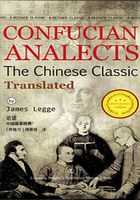
CHAPTER 1
1. The Master said, "Is it not pleasant to learn with a constant perseverance and application?"
2. "Is it not pleasant to have friends coming from distant quarters?"
3. "Is he not a man of complete virtue, who feels no discomposure though men may take no note of him?"
TITLE OF THE WORK—论语, 'Discourses and Dialogues;' that is, the discourses or discussions of Confucius with his disciples and others on various topics, and his replies to their inquiries. Many chapters, however, and one whole book, are the sayings, not of the sage himself, but of some of his disciples. The characters may also be rendered 'Digested Conversations,' and this appears to be the more ancient signification attached to them, the account being, that, after the death of Confucius, his disciples collected together and compared the memoranda of his conversations which they had severally preserved, digesting them into the twenty books which compose the work. Hence the title—论语, 'Discussed Sayings,' or 'Digested Conversations.' See论语注疏解经序. I have styled the work 'Confucian Analects,' as being more descriptive of its character than any other name I could think of.
HEADING OF THIS BOOK—学而第一. The two first characters in the book, after the introductory—'The Master said,' are adopted as its heading. This is similar to the custom of the Jews, who name man books in the Bible from the first word in them. 第一, 'The first'; that is, of the twenty books we find a unity or analogy of subjects, which evidently guided the compilers in grouping the chapters together. Others seem devoid of any such principle of combination. The sixteen chapters of this book are occupied, it is said, with the fundamental subjects which ought to engage the attention of the learner, and the great matters of human practice. The word学, 'learn', rightly occupies the forefront in the studies of a nation, of which its educational system has so long been the distinction and glory.
1. THE WHOLE WORK AND ACHIEVEMENT OF THE LEARNER, FIRST PERFECTING HIS KNOWLEDGE, THEN ATTRACTING BY HIS FAME LIKE-MINDED INDIVIDUALS, AND FINALLY COMPLETE IN HIMSELF. 1. 子, at the commencement, indicates Confucius. 子, 'a son', is also the common designation of males,—especially of virtuous men. We find it, in conversations, used in the same way as our 'Sir'. When it follows the surname, it is equivalent to our 'Mr.' or may be rendered 'the philosopher', 'the scholar', 'the officer', etc. Often, however, it is better to leave it untranslated. When it precedes the surname, it indicates that the person spoken of was the master of the writer, as 子沈子, 'my master, the philosopher 沈'. Standing single and alone, as in the text, it denotes Confucius, the philosopher, or, rather, the master. If we render the term by Confucius, as all preceding translators have done, we miss the indication which it gives of the handiwork of his disciples, and the reverence which it bespeaks for him. 学, in the old commentators, is explained by 诵, 'to read chantingly', 'to discuss'. Choo He interprets it by 效, 'to imitate', and makes its results to be 明善而复初, 'the understanding of all excellence, and the bringing back original goodness'. Subsequent scholars profess, for the most part, great admiration of this explanation. It is an illustration, to my mind, of the way in which Choo He and his followers are continually being wise about what is written in the classical books. 习 is the rapid and frequent motion of the wings of a bird in flying, used for 'to repeat', 'to practice'. 之is the obj. of the third pers. Pronoun, and its antecedent is to be found in the pregnant meaning of 学. 不亦 is explained by岂不, 'is it not?' See 四书补注备旨. To bring out the force of 'also' in 亦, some say thus:—'The occasions for pleasure are many, is this no also one?' 说, read yuĕ, as always when it has the 4th tone marked, stands for 悦. What is learned becomes by practice and application one's own, and hence arises complacent pleasures in the mastering mind. 悦 as distinguished from 乐, lŏh, in the next par., is the internal, individual feeling of pleasure, and the other, its external manifestation, implying also companionship. 2. 朋, properly, 'fellow-students'; but, generally, individuals of the same class and character, like-minded. 3. 君子 I translate here—'a man of complete virtue'. Literally, it is—'a princely man'. See on 子, above. It is a technical term in Chinese moral writers, for which there is no exact correspondency in English, and which cannot be rendered always in the same way. See Morrison's Dictionary, char.子. Its opposite is 小人, 'a small, mean man'. 人不知, 'Men do not know him,' but anciently some explained—'men do not know', that is, are stupid under his teaching. The interpretation in the text is doubtless the correct one.
